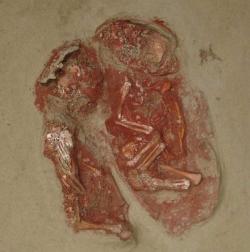Imagine Life and Love 27,000 Years Ago

Twins interred 27,000 years ago

Sometimes it's pretty easy to empathize with the pain and joy of earlier generations. We have written records of suffering and happiness, going back several thousands years. Through the written word, we can stand beside Socrates in ancient Athens as he defended himself against trumped up charges of corrupting the youth. We can feel his pain as he drank the hemlock to comply with his death sentence. Technology makes it even easier to feel the pain of others. Through television, we can see for ourselves the sadness of Americans as they said goodbye to a fallen president in November of 1963.
It's a lot harder to turn back the hands of time 27,000 years and understand the feelings of people of that era. We have no written records of them. Nothing to tell us who they were. Of course, in a basic sense, we know who they were. Our ancestors!
The picture in this post might make it a tad easier to realize that pre-historic people had feelings too. Twenty-seven thousand years ago, when Neanderthals were giving way to modern homo sapiens, these twin newborns were lovingly buried on a beautiful hillside overlooking the Danube River in what is today Austria.
Their tiny bodies were covered with the shoulder blade of a wooly mammoth to protect them as they journeyed into eternity. Beads were placed in their graves. Someone loved them very much.
Who was their mother? What became of her? Did she have other children? We'll never know much more than that somebody cared. Maybe that's enough. Link







1 Comments:
Very moving photograph. As an anthropolgoy major, I'm often forced to question my own ideas about humanity and what defines "modern humans."
In fact, recent studies of Neanderthal sites show that they intentionally buried their dead (with or without ritual is still being debated), and may have cared for the sick and injured.
So maybe "modern" humans aren't so modern after all.
Post a Comment
<< Home